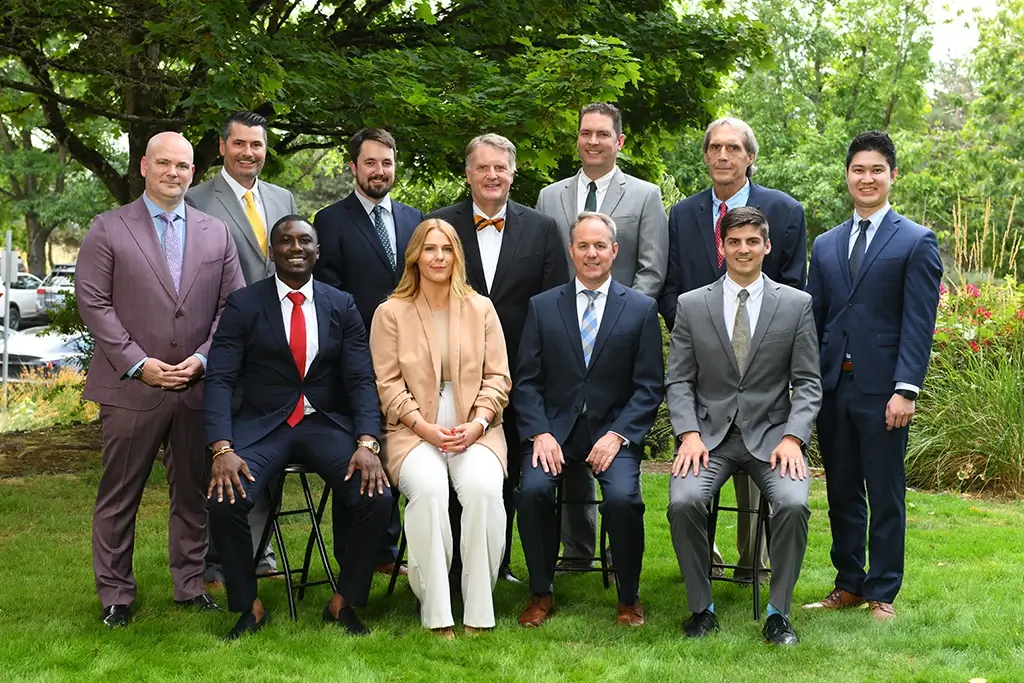We Answer Your Questions
Albany | Bend | Coos Bay | Eugene | Grants Pass | Klamath Falls | Medford | East Portland | West Portland | Roseburg | Salem | Tri-Cities | Vancouver | Yakima
Legal Consultation

Personal Injury Law FAQs
Are you considering a personal injury claim? You probably have questions – everybody we meet with does. Below you’ll find some of the most frequently asked questions we get about personal injury lawsuits.
These FAQs are not intended as legal advice, but if you are looking for legal advice, we would be happy to discuss your options with you. Call us today or make an appointment for a free consultation at our office. We’re an experienced personal injury law firm and advocate for you.
Choosing the Right Personal Injury Attorney
There are so many personal injury attorneys to choose from, making this one of the most important questions to ask yourself as you begin the process. You will want to work with an attorney who is willing to listen to you, and someone that you are willing to listen to. You want someone whose goals align with yours and that you believe will be in your corner and advocate for you at every corner.
Before you decide, do some research, read reviews, schedule free consultations, and speak with a few different attorneys – you will speak with this person regularly, so make sure you are comfortable with them. Ultimately, trust your instincts.
There are many reasons why you should hire a personal injury attorney to represent you. Studies have shown that individuals who hire attorneys often receive higher settlements or awards than those who represent themselves.
Additionally, you don’t have to pay upfront for a personal injury attorney (most of the time). Most personal injury attorneys, including here at OlsenDaines, work on a contingency basis. That means we only get paid when we bring your claim to conclusion and receive settlement money. There are zero out-of-pocket costs to you. We will never send you an invoice or bill you for the time we spend on your claim.
To begin with, it’s a complicated and stressful process; a personal injury attorney will have a thorough understanding of legal processes, including filing deadlines, documentation requirements, and correct procedures. Attorneys are skilled negotiators who can deal with insurance companies and other lawyers are experienced in negotiating settlements that fairly compensate for your injuries and other losses, including calculating different types of damages.
If a settlement cannot be reached, your personal injury attorney will represent you in court, increasing the likelihood that you win.
Most personal injury lawyers work on contingency, meaning they only get paid when you win the case. Under this model, it doesn’t cost anything to hire one, and you don’t pay anything unless you win.
Personal Injury Claim Basics
In the context of civil law, “personal injury” refers to any harm caused to a person resulting from the negligence of another person. This can mean anything from a broken bone or whiplash if someone was involved in a motor vehicle accident through no fault of their own, or maybe tripped and fell on somebody’s property from a concealed danger that should have been prevented, and experienced bodily injury to emotional distress following a traumatic event.
Personal injury law covers harm to a person’s body, mind, or emotions caused by someone else. These are some of the common types:
Yes, personal injury lawsuits have a statute of limitations, meaning they must be filed within a certain amount of time of the event happening. The statute of limitations varies depending on jurisdiction. In Washington, the statute of limitations for personal injury claims is three years. In Oregon, it’s two years.
There are other timing considerations for wrongful death, medical malpractice, bringing claims against public entities such as the State of Oregon, as well as cities and counties, or for bringing claims against bars/restaurants/taverns for overserving a drunk driver. These factors can be complex and require immediate attention from a lawyer to ensure that you preserve your claim. Otherwise, you can be excluded from bringing your claim forward.
The three types of damages covered in a personal injury lawsuit are:
- Economic – This covers things like medical expenses, lost wages, property damage, and any other ways you were injured that can be measured in monetary value.
- Non-economic – Damages that result from pain and suffering and emotional distress; these don’t have an easily defined monetary value, but the court will attempt to assign one.
- Punitive – Punitive damages are awarded in cases where the defendant is found to have been especially egregious or negligent, resulting in injury.
If you’re the subject of a complaint or you’re being sued, your liability is the amount you could potentially owe the plaintiff.
Typically, personal injury claims must be submitted in the state where the injury occurred. That state’s laws will govern how the claim moves forward. We strongly recommend hiring an attorney licensed in the state where the injury happened, as they will be most familiar with the intricacies of local jurisdictions and give you the best chance to win your case.
You may receive medical care in any state – it does not have to be where the injury happened. Just make sure to keep thorough documentation!
What to Expect with Your Personal Injury Claim
After you file a lawsuit, the other party will have time to respond. They may explore a settlement with you. If a settlement can be reached, that’s often the easiest outcome for everyone involved. If a settlement can’t be reached, the lawsuit will go to trial to determine the outcome.
The compensation for a personal injury is intended to be comprehensive, covering every way you were injured by the event. In determining this and the resultant compensation amount, many factors are considered. The court will consider economic, non-economic, and sometimes, punitive damages. Economic damages include medical expenses, lost wages, and property damage. Non-economic damages include pain, suffering, and emotional distress. Punitive damages are designed to punish the defendant in cases where they acted exceptionally recklessly or negligently.
In Oregon and Washington, personal injury claims often get resolved through negotiation and mediation. An independent mediator or arbitrator may help the two parties come to an agreement and avoid going to trial. If mediation or arbitration does not resolve the dispute, the next stage is trial.
In Oregon, personal injury trials are decided by a jury. In Washington, cases may be decided by a judge or a jury.
In total, a personal injury lawsuit can take several months on the short side to several years on the long side. The scope and complexity of the case, as well as how much potential damages are at stake, have a lot to do with the timeline.
Once you decide to move forward with a personal injury claim, your attorney will start preparing the case. This usually takes a few weeks for small cases to several months for large cases. After that, the lawsuit will be filed and discovery will happen. During discovery, the opposing sides will review any evidence that could be used in deciding the case. This can all take several months to a year for complex cases.
From there, the parties may engage in settlement negotiations. This can take a few months of back and forth. If no agreement is reached, the case will go to trial.
This always depends on the details of the case. If you have been injured and another party is legally responsible, your chances are good. A quality personal injury attorney should be able to present the facts in such a way that you win your case or reach a settlement.
When you have a consultation with a personal injury attorney, they’ll review the facts of the case with you and provide an honest assessment of your chances.
Approximately 5-10% of personal injury lawsuits go to trial. Most of the time, they’re settled out of court without a trial.
Since most personal injury attorneys (including OlsenDaines) work on contingency, they only get paid if you win your case. If you lose your case, you don’t owe them anything. If you lose your case, you may be on the hook for court costs, which include filing fees and other miscellaneous expenses.
Some personal injury attorneys may agree to absorb the court costs if you lose your case. Be sure to discuss potential costs with your attorney when you first meet with them.
Of course. Your lawyer should be accessible to you while your case is going on. If they’re not available to speak with you when you have a question, they should get back to you quickly. At OlsenDaines, we pride ourselves on clear client communication and responsiveness.
Settlements and Compensation
Gathering all the facts and making a decision can be a lengthy process, but there are laws designed to ensure that insurance companies will move as quickly as possible. As a ballpark estimate, you should expect the insurance company at least three months to respond to a personal injury claim. Sometimes, it’s longer. These are the different phases of the process:
- Acknowledgment of Claim: Insurance companies must acknowledge receipt within 10 working days after receiving notification of a claim.
- Prompt Investigation: Once a claim has been acknowledged, insurers must initiate an investigation promptly and should complete their investigation within 30 days after notification of the claim, if possible.
- Response to Communication: Insurers must respond to all communications about a claim reasonably promptly. If a more detailed reply than can be given within 10 working days is necessary, insurers should give an interim response.
- Decision on Claims: The insurer is allowed 30 days to decide on a claim. If the claim is complex and requires more than 30 days, they must provide a written explanation within 30 days.
- Payment of Settlements: Once a settlement is agreed upon, payment must be made within 30 days.
If you have permanent injuries, they will be factored into the scope of any settlement or awarded damages. For example, permanent injuries likely mean greater economic damages like future medical expenses, rehabilitation, and loss of earning capacity. Non-economic damages will also be considered, such as increased pain and suffering and emotional distress, which are very common in people with permanent injuries. Your doctor may also draw up a life care plan, outlining your future needs, which will be important evidence during a trial or settlement negotiations.
Free Bankruptcy and Personal Injury Consultations
Nearly 40 years ago, our bankruptcy firm was one of the first law practices to offer free consultations to potential bankruptcy clients. It is our mission to educate, inform and empower people about their legal options for dealing with debt. We believe information goes a long way toward helping with the stress of filing bankruptcy.
Personal Injury Law FAQs in Portland OR and Salem OR
And all surrounding areas
Albany | Bend | Coos Bay | Eugene | Grants Pass | Medford | Klamath Falls
East Portland | West Portland | Roseburg | Salem | Tri-Cities | Vancouver | Yakima
Home » Personal Injury Law » Personal Injury Law FAQs

